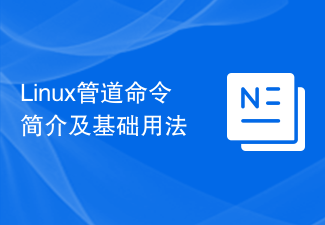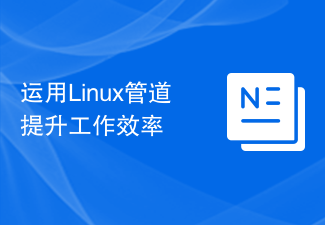Pipeline is a concurrency mechanism that allows communication between Goroutines. They are collections of unbuffered or limited-buffered channels that can be used to parallelize processing tasks and increase application throughput. Details are as follows: Create a pipe: Use the make(chan T) function, where T is the data type to be transferred. Send data: Use the

Pipelines in Golang function communication
In Go, pipelines are a concurrency mechanism used for communication between functions. They are a collection of unbuffered or limited buffered channels that allow Goroutines to send and receive data between each other. Pipes provide higher throughput than channels and allow Goroutines to process tasks in parallel.
How to use pipes
To create a pipe, you can use the make(chan T) function, where T is the Type of data transferred. For example:
ch := make(chan int)
To send data to the pipe, you can use the operator:
go func() {
ch <- 42
}()To receive data from the pipe, you can use the operation Symbol:
data := <-ch
Pipeline example:
Consider an application that needs to calculate a large data set. We can use pipes to split the dataset into chunks and send them to the Goroutine pool. The Goroutine pool will process these chunks and return results, which will be piped back to the main Goroutine. This will allow Goroutines to process data in parallel, thereby increasing the throughput of your application.
Code example:
package main
import (
"fmt"
"sync"
)
func main() {
// 创建管道
ch := make(chan int)
// 创建 Goroutine 池
var wg sync.WaitGroup
for i := 0; i < 5; i++ {
wg.Add(1)
go func(i int) {
defer wg.Done()
// 从管道接收块
data := <-ch
// 处理块
result := data * data
// 将结果发送回管道
ch <- result
}(i)
}
// 向管道发送块
for i := 0; i < 10; i++ {
ch <- i
}
// 关闭管道
close(ch)
// 等待 Goroutine 池完成处理
wg.Wait()
// 从管道接收结果
for result := range ch {
fmt.Println(result)
}
}Unbuffered and limited buffered pipes
Unbuffered pipes are transient and data can only Transmission occurs when both the sender and receiver are ready. Bounded buffered pipes can store a certain amount of data, allowing the sender to send data before the receiver is ready. Unbuffered pipes have higher communication throughput, while limited buffered pipes can buffer bursts of communication and prevent data loss.
The above is the detailed content of Analysis of the role of pipelines in golang function communication. For more information, please follow other related articles on the PHP Chinese website!
 如何在 Golang 中使用管道实现文件读写?Jun 04, 2024 am 10:22 AM
如何在 Golang 中使用管道实现文件读写?Jun 04, 2024 am 10:22 AM通过管道进行文件读写:创建一个管道从文件读取数据并通过管道传递从管道中接收数据并处理将处理后的数据写入文件使用goroutine并发执行这些操作以提高性能
 聊聊Golang中的几种常用基本数据类型Jun 30, 2022 am 11:34 AM
聊聊Golang中的几种常用基本数据类型Jun 30, 2022 am 11:34 AM本篇文章带大家了解一下golang 的几种常用的基本数据类型,如整型,浮点型,字符,字符串,布尔型等,并介绍了一些常用的类型转换操作。
 为速度而生:PHP 与Golang 的合体 —— RoadRunnerSep 23, 2022 pm 07:40 PM
为速度而生:PHP 与Golang 的合体 —— RoadRunnerSep 23, 2022 pm 07:40 PM发现 Go 不仅允许我们创建更大的应用程序,并且能够将性能提高多达 40 倍。 有了它,我们能够扩展使用 PHP 编写的现有产品,并通过结合两种语言的优势来改进它们。
 Linux管道命令简介及基础用法Feb 22, 2024 pm 05:57 PM
Linux管道命令简介及基础用法Feb 22, 2024 pm 05:57 PMLinux中的管道命令是一种强大的工具,可以将一个命令的输出作为另一个命令的输入,实现不同命令之间的数据传输与处理。本文将介绍Linux中管道命令的基础知识,以及一些常用的用法和代码示例。管道命令简介在Linux系统中,管道命令使用竖线符号(|)连接两个或多个命令,例如:command1|command2这样,command1的输出会作为command2
 运用Linux管道提升工作效率Feb 22, 2024 pm 09:30 PM
运用Linux管道提升工作效率Feb 22, 2024 pm 09:30 PM在当今信息化社会,计算机已经成为我们工作生活中不可或缺的工具。而作为一名熟练运用Linux系统的工作人员,如何利用Linux的强大功能提升工作效率是非常重要的。本文将重点介绍如何运用Linux中的管道(Pipes)这一重要功能来简化工作流程,提高工作效率。Linux的管道是一种特殊的文件类型,它可以将一个命令的输出直接传递给另一个命令,从而在不存储中间结果的
 如何使用 Go 语言中的管道实现超时机制?Jun 03, 2024 pm 03:01 PM
如何使用 Go 语言中的管道实现超时机制?Jun 03, 2024 pm 03:01 PM使用管道实现超时机制:创建一个管道。创建一个goroutine来等待管道中的元素。在另一个goroutine中,在指定时间后关闭管道。使用select语句来在管道元素到达或超时时选择执行相应的操作。
 golang管道与函数通信的同步机制May 02, 2024 pm 04:21 PM
golang管道与函数通信的同步机制May 02, 2024 pm 04:21 PMGo语言中管道与函数通信的同步机制是通过管道缓冲阻塞来实现的,确保数据传输的顺序和安全性。具体包括:管道为空时,接收数据会被阻塞。管道已满时,发送数据会被阻塞。实战案例:计算斐波那契数列,使用管道同步计算结果的传输。


Hot AI Tools

Undresser.AI Undress
AI-powered app for creating realistic nude photos

AI Clothes Remover
Online AI tool for removing clothes from photos.

Undress AI Tool
Undress images for free

Clothoff.io
AI clothes remover

AI Hentai Generator
Generate AI Hentai for free.

Hot Article

Hot Tools

SAP NetWeaver Server Adapter for Eclipse
Integrate Eclipse with SAP NetWeaver application server.

Dreamweaver Mac version
Visual web development tools

ZendStudio 13.5.1 Mac
Powerful PHP integrated development environment

Atom editor mac version download
The most popular open source editor

SublimeText3 Linux new version
SublimeText3 Linux latest version







